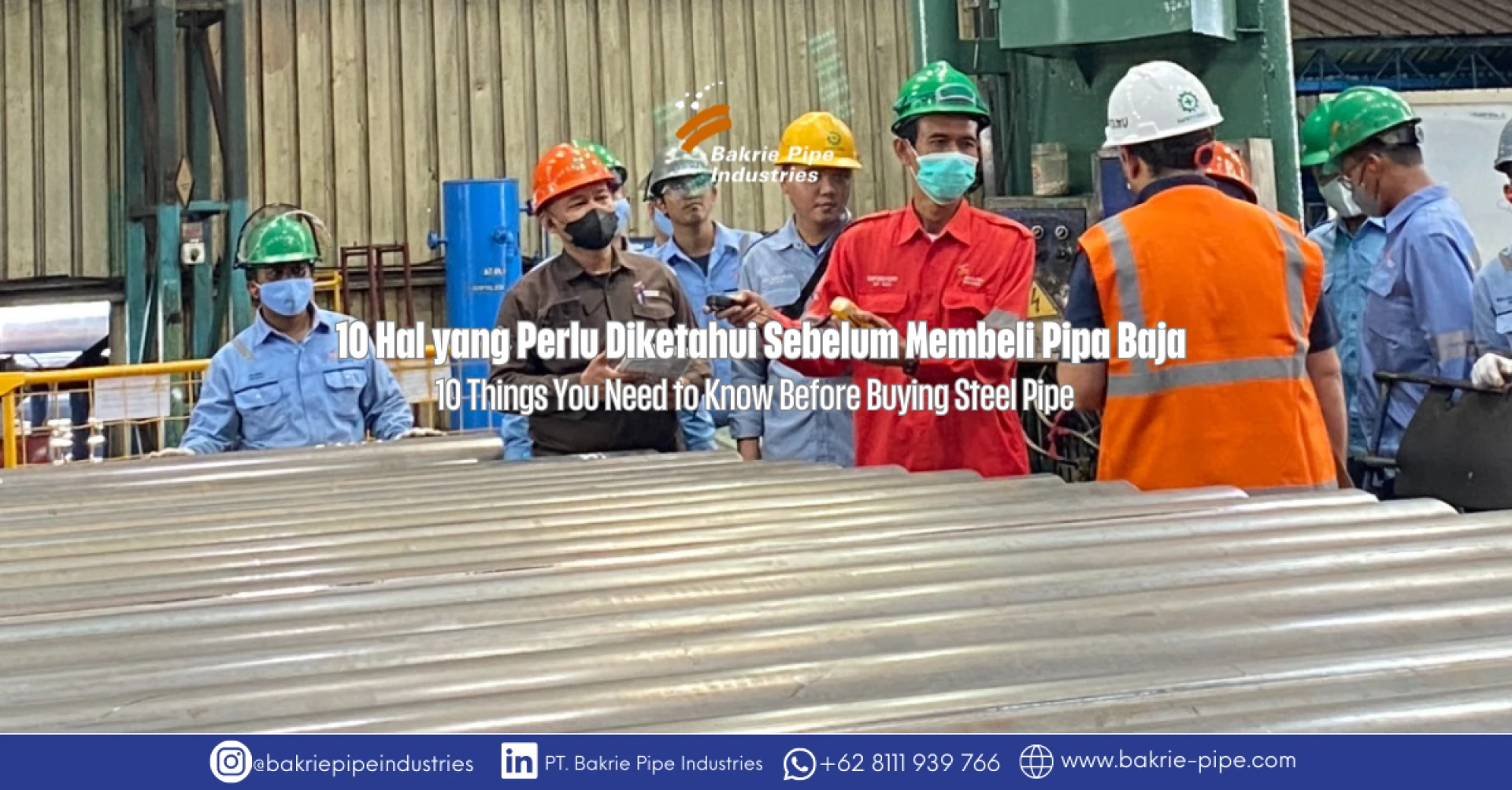Hello Pipe Enthusiasts!
Before buying steel pipe for industrial, construction, transmission, or oil and gas projects, there are 10 important things you must understand so that technical and commercial decisions are correct. This article summarizes terms, production types, specifications, protection, documentation, and total cost of ownership (TCO) factors from BPI’s practical perspective.
1. Make Sure the Terms Used Are Correct
Know the difference in terms: steel pipe (general term), carbon steel pipe (technical category with controlled carbon content), and iron pipe (colloquial term that sometimes refers to products made of cast iron). Use the correct terms in tender specifications to avoid misinterpretation.
2. Determine the Appropriate Production Type
For large diameters and long deliveries, High Frequency Welding (HFW) / Electric Resistance Welding (ERW), Longitudinal Sub-merged Arc Welding (LSAW), and Helical Sub-merged Arc Welding (HSAW) are often chosen due to production efficiency and application needs. Choose the welded type that fits based on diameter requirements, tolerances, and structural or transmission application.
3. Match Material Grade to Operating Conditions
Determine material grade based on design pressure, operating temperature, and cyclic loading. For corrosive environments or those containing H2S, consider materials and grades that meet sour service requirements. Each standard has grades and levels for needs—for example API 5L with Grade B and PSL 1, or ASTM A252 Grade 3.
4. Choose the Right Coating for Protection
Coatings such as Fusion Bonded Epoxy (FBE), Three-Layer Polyethylene (3LPE), Three-Layer Polypropylene (3LPP), and Concrete Weight Coating (CWC) are commonly used for long-term protection and are typical in oil and gas projects. For special applications, galvanizing, internal/external epoxy painting, or cement lining may be available. Choose coatings based on the environment (marine, buried, or corrosive atmosphere) and desired maintenance practices.
5. Request Complete Quality Documentation
Include mandatory tender requirements: Material Test Certificate, Mill Test Report (MTR) or Mill Test Certificate, NDT results (UT, RT, MPI where relevant), and proof of compliance with standards requested by the client such as API, ASTM, JIS, AWWA, UL, or SNI. Documentation accelerates supplier qualification and audits.
6. Check Welding Procedures and Quality Control
For welded pipes in oil and gas projects, verify welding procedures (WPS/PQR), welder qualifications, personnel qualifications, and the Quality Control plan, which are typically required to ensure integrity and quality control.
7. Consider Total Cost of Ownership (TCO)
Calculate not only the initial price but also coating costs, shipping costs, installation costs, inspection, maintenance frequency, and potential downtime. The cheapest initial solution may not be the most economical over the service life.
8. Evaluate Lead Time and Production Capacity
Ensure the supplier has production capacity and delivery schedules that align with the project timeline. For large volumes or special diameters, plant capacity and production flexibility determine procurement success.
9. Request Technical Support from the Supplier
A good supplier offers technical consultation: grade recommendations, coating options, welding procedures, and specification revisions so the pipe meets operational and tender requirements. Technical support minimizes the risk of mismatched specifications.
10. Consider Certification and Audit Readiness
For oil and gas projects, public infrastructure, or large corporate clients, ensure the supplier is ready with management system certifications (e.g., ISO 9001, ISO 45001, ISO 14001, ISO 17025, ISO 37001), product certificates (e.g., API 5L, API 5CT, SNI), and Domestic Component Level (TKDN) compliance.
Closing
Before buying steel pipe: use the correct terms, choose welded production methods suitable for diameter and needs, determine grade and coating based on operating conditions, ensure complete quality documentation, and calculate TCO thoroughly. Involve suppliers for technical support and confirm production capacity and certification readiness so procurement runs smoothly.
Bakrie Pipe Industries has experience supplying steel pipe for national and international needs and has been trusted by our customers for more than 60 years. Contact our Marketing and Sales team for your steel pipe needs; our team of expert Engineers is ready to assist.
